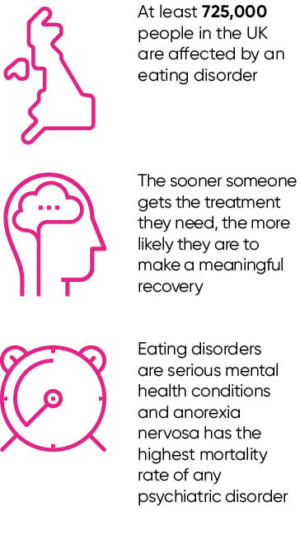 “When evidence clearly shows that early intervention in eating disorders is crucial to reversing what can rapidly become an enduring and debilitating condition, waiting for more than 100 days for treatment is very worrying,” warns Peter Curtis, managing director of Ellern Mede, a London centre which has one of very few eating disorder specialist high-dependency units in the world.
“When evidence clearly shows that early intervention in eating disorders is crucial to reversing what can rapidly become an enduring and debilitating condition, waiting for more than 100 days for treatment is very worrying,” warns Peter Curtis, managing director of Ellern Mede, a London centre which has one of very few eating disorder specialist high-dependency units in the world.
If eating disorders are addressed in time, treatment outcomes improve and potentially life-threatening complications affecting both physical and mental health can be prevented.
Incidence is highest among teenagers, with many patients eligible for NHS Child and Adolescent Mental Health Services. The Department of Health has set a target to reduce waiting times for treatment for eating disorders to four weeks by 2020. Health policy is steering providers to outpatient and shorter-term services for eating disorders, and provision of care from the independent sector will play an important role in helping to beat this devastating illness.
The focus of health policy is to make treatment more accessible and affordable through short-term inpatient stays, supplemented by linked outpatient care. By intervening earlier in the eating disorder, Ellern Mede’s team of experts believe many more families and their loved ones can be spared a lifetime of suffering.
Recent international research suggests that access to specialist eating disorder treatment within the early months of its onset is likely to result in 60 to 80 per cent recovery rates.
There is a real possibility that by offering short-term accessible, affordable eating disorder treatment as soon as it is diagnosed, we may see a tangible improvement in recovery rates
Ellern Mede is a specialist hospital that focuses on providing care for eating disorders and commonly related conditions. The hospital currently cares for young people from anywhere in the UK and globally.
This May sees the opening of Ellern Mede’s new purpose-designed hospital, Ellern Mede Barnet. This complements its current provision at Ellern Mede Ridgeway inpatient hospital and outpatient clinics in Harley Street and Wimpole Street, London. It also sees the introduction of an evidence-based family therapy-centred treatment model adapted by Ellern Mede for UK private clients, as well as the launch of a short-term “symptom interruption” adult bulimia inpatient programme.
Affordability for people who seek to fund their own treatment lies in the time-limited nature of Ellern Mede’s treatment programme. Similar programmes have been proven to improve significantly eating disorders among patients in the United States over the past ten years.
“There is a real possibility that by offering short-term accessible, affordable eating disorder treatment as soon as it is diagnosed, we may see a tangible improvement in recovery rates,” says Dr Hind Al Khairulla, clinical director of Ellern Mede.
“We could see a consequent reduction in both numbers of patients requiring longer-term inpatient care and also a reduction in the average length of stay at inpatient units. At Ellern Mede, our positive experience with recovery through intensive interventions, even for the most seriously ill patients, indicates that our new outpatient and inpatient programmes can make a real difference to recovery rates.”
Ellern Mede currently treats more than 100 patients a year in its 26-bed unit at Mill Hill, many of those funded by the NHS. Its expansion to outpatient services and the model of short-term inpatient stays at its new unit nearby in Barnet is expected to increase significantly the number of patients it treats.
So, will this private sector-led model prove to be the beginning of a solution that the health sector will embrace for the future of eating disorder treatment? With as many as 725,000 people in the UK alone thought to have eating disorders, which have a higher mortality rate than any other mental illness, this is something health professionals will be watching with interest.
For more information on eating disorders or Ellern Mede please visit www.ellernmede.org or call 0203 210 2030

